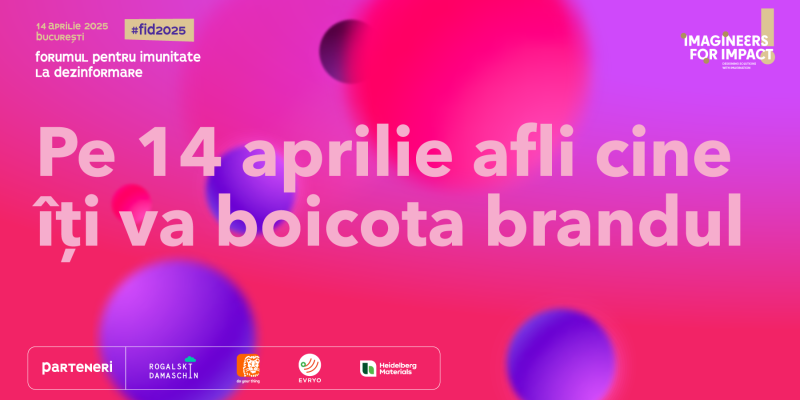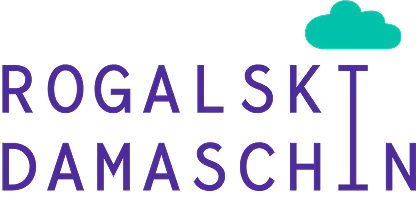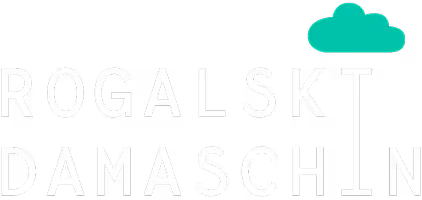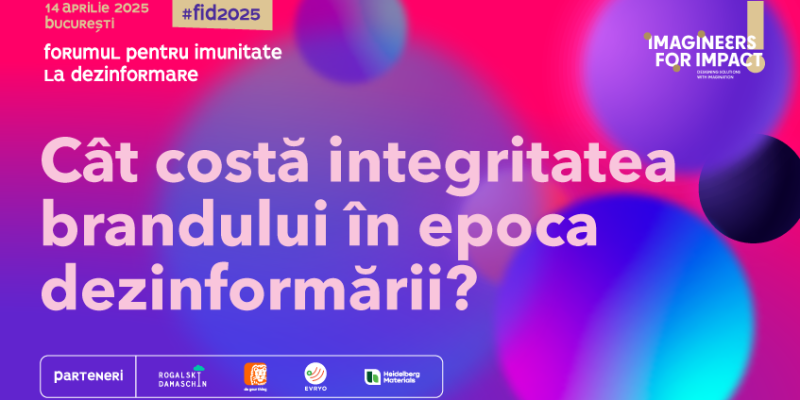
4 Reputation Crisis Scenarios Companies Need to Prepare for in 2025
- Disinformation is one of the main sources of crises for companies in 2025.
- The Forum for Immunity to disinformation (#FID2025) presents case studies and offers practical solutions to crises caused by disinformation.
What are the biggest reputational crisis risks for companies in 2025 and how can you manage them effectively?
A study conducted at the beginning of 2025 shows that disinformation is the first source of crises for companies, following predictable political and economic events expected this year (elections, inflation, trade deficits).
Disinformation directly affects the reputation of companies
If the latter two influence the life of the entire society, disinformation directly targets the reputation of organizations, and according to the research, crisis management strategies must be revised to adapt to this new risk context.
Companies that are the targets of operations of disinformation are more likely to be negatively perceived on social media platforms and lose value in the market, while experiencing an increase in stress indicators among employees.
THE FORUM FOR IMMUNITY TO DISINFORMATION
On April 14th, at the Novotel Hotel in Bucharest, took place the FORUM FOR IMMUNITY TO DISINFORMATION (#FID2025), a practical event dedicated to specialists who manage the reputation of companies.
The participants - company leaders, specialists in marketing and communication or in the legal field had the opportunity to find out:
- examples of good practice
- case studies to prevent or combat the effects of disinformation
- what tools are effective against disinformation
- How to prevent or manage crises caused by disinformation
Scenarios of reputational crises generated by disinformation
Disinformation can take many forms. Here are some reality-inspired scenarios where disinformation can have significant negative effects on your organization:
Crisis Scenario 1: An Influential Politician Spreads Fake News About a Romanian Multinational
A politician takes a news story from a website and publicly announces that a large multinational company will lay off employees due to the unstable economic and geo-political context. The information cannot be verified, since it has no author, but the site is constantly a source that broadcasts fake news.
The post triggers a rapid and large-scale reaction from the public, sparking concern among employees.
In a very short time, a new wave of social media posts emerges, inciting critical comments, hate-speech and bullying towards the leaders of the respective company and, in general, against all companies with foreign capital.
At FID2025 participants learned with what kind of tools they can manage or prevent such a situation.
Crisis scenario 2: A Facebook group attacks a producer in the food industry
A message posted in a Facebook group dedicated to healthy eating claims that a food brand uses an ingredient that is claimed to be extremely dangerous to health and cause serious illness.
The post includes an image with the product label and a link to an article written in an alarmist tone, but without scientific sources, about the dangers of this ingredient. Members of the group begin to massively distribute information and urge a boycott of the respective products, commenting negatively on the company's pages.
In a short time, the information reaches influencers and even some online publications that take on the claims without verifying that they are true.
Although the ingredient complies with all regulations and is considered safe for consumption, the company is experiencing an image crisis. Consumers become suspicious, and sales begin to decline. In addition, the company must manage the wave of negative reactions, even if the information spread is false or exaggerated.
At FID2025 participants learned the most interesting case studies to successfully manage a reputational crisis of this kind.
Crisis scenario 3: Pharmaceutical company, accused of inventing diseases in the laboratory for profit
An anonymous video posted on social media claims that a pharmaceutical company is developing a treatment for a rare condition that it has “triggered.” The cause would be a controversial ingredient present in dietary supplements and widely used cosmetic products.
The video shows “anonymous inside sources” and includes images of labs, test tubes and teams of researchers working on the new treatment.
The video quickly goes viral, and social media users massively redistribute it, using hashtags such as #BigPharmaScam or #PoisonForProfit.
Online groups promoting conspiracy theories about the pharmaceutical industry amplify the message. Also, some influencers in the field of alternative health suggest that natural treatments would be intentionally “blocked” by large companies in order to maintain a monopoly over the pharmaceutical industry.
In just a few days, the company faces an avalanche of negative comments and calls for a boycott on social networks. In addition, regulators receive numerous referrals asking for investigations, even though there is no real evidence to support the allegations.
At FID2025 participants learned how to restore public trust amid a public controversy.
Crisis scenario 4: Financial company accused of making too much profit
An apparently harmless announcement advertisement published on the website of a company in the field of financial-banking services reports on very good financial results. It is accompanied by a press release to the the business media.
The news shared by an economic newspaper on its social networks generates in 24 hours the hashtag #ProfitAtTheExpenseOfPeople which reaches the top 5 trending in social media in Romania.
Users post screenshots of the high prices or commissions practiced by the company and compare them with low wages. Civic and financial influencers amplify the controversy with videos that garner over 100,000 views in 3 hours.
On Facebook, advocacy groups and employee communities are posting viral posts: “We worked for this money — they reported it as profit.”
A well-known economic analyst writes on LinkedIn: “It is inadmissible for a company to have such a large margin in a sector that should provide support, not exploitation.”
The intervention of the Financial Supervisory Authority and the Consumer Protection Authority is requested to analyze the company's practices.
At FID2025 participants learned how to prevent or manage crises arising from the overlap of multiple social narratives.
What's going on at the FORUM FOR IMMUNITY TO DISINFORMATION?
The agenda of the FORUM FOR IMMUNITY TO DISINFORMATION consisted of two sessions:
- a theoretical session, with presentations and debates led by invited experts
- practical session, with workshops dedicated to combating disinformation, to which the participants of the event can sign up for.
THE FORUM FOR IMMUNITY TO DISINFORMATION is an initiative of Imagineers for Impact, a non-profit organization founded in 2024 with the goal of creating a resilient society and communities educated through inspiration.
The partners who supported this event are Rogalski Damaschin— Truth Champion and ING Bank Romania, Evryo, Heidelberg Materials Romania, as Guardians of Truth.
Questions about disinformation and reputational crises
- What are the most effective tools to combat fake news?
Effective tools to combat fake news include fact-checking, collaboration with independent experts and communication campaigns aimed at building trust, transparency and credibility with the public.
- Why was it important to participate in an event such as FID2025?
Events of this type provide access to practical know-how, networking with professionals and solutions tested in real situations.
- Are SMEs as vulnerable as large corporations to disinformation?
Yes. Disinformation affects companies of all sizes, but SMEs can be even more exposed due to limited resources.






